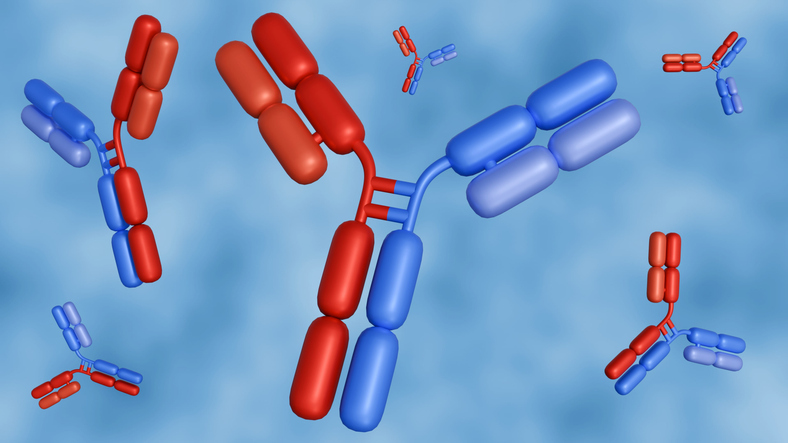
Genmab’s growth and pipeline diversification strategy is picking up another piece through the acquisition of Merus in an $8 billion deal focused on a late-stage drug candidate projected to become a blockbuster seller in head and neck cancer.
Financial terms of the acquisition agreement announced Monday call for Genmab to pay $97 in cash for each share of Merus, which represents a 41% premium to the stock’s closing price on Friday.
Merus’s drugs are antibodies designed to hit multiple targets on cancer cells. Lead drug candidate petosemtamab, or peto for short, is a bispecific antibody that targets EGFR and LGR5, two proteins overexpressed on cells of certain types of solid tumors. In addition to inhibiting the two proteins and their roles in driving cancer growth, peto offers a third mechanism of action by prompting immune cells to target and kill the cancer cells. Peto’s lead indication is head and neck cancer. While checkpoint inhibitors are approved to treat head and neck cancers, low response rates to this type of immunotherapy leave an unmet need for patients.

The Power of One: Redefining Healthcare with an AI-Driven Unified Platform
In a landscape where complexity has long been the norm, the power of one lies not just in unification, but in intelligence and automation.
In interim Phase 2 results, peto achieved a 60% overall response rate and a median duration of response of 11 months tested alongside the Merck checkpoint inhibitor, Keytruda. After the presentation of these data during the annual meeting of the American Society of Clinical Oncology this past June, industry analysts said the results gave the Merus drug an edge over ficerafusp alfa, a bifunctional antibody from Bicara Therapeutics designed to target EGFR and a different protein called TGF-beta.
The Bicara and Merus drugs have both reached pivotal testing in head and neck cancer. Merus’s peto is being evaluated in two Phase 3 studies, one as a first-line treatment and the other as a second-line therapy. Genmab and Merus expect one or both studies will yield data in 2026. If all goes well, Genmab projects peto could reach the market in 2027. A separate Phase 1/2 program is evaluating the drug in metastatic colorectal cancer. Merus has said it expects preliminary data from this study in the second half of this year.
Genmab specializes in antibody drugs. For years, its antibodies have reached patients as part of drugs developed by larger partners. The biggest source of Genmab’s revenue is the royalty Johnson & Johnson pays for Darzalex, the monoclonal antibody that has become a standard treatment for multiple myeloma. But Genmab has mapped out a strategy to develop and commercialize drugs it fully owns. Last year, it paid $1.8 billion to buy Profound Bio, developer of antibody drug conjugates for cancer. Rina-S, an ovarian cancer drug candidate from that deal, is expected to post Phase 2 data in 2026. Acasunlimab, a bispecific antibody wholly owned by Genmab, is in development as a second-line treatment for non-small cell lung cancer; Phase 2 data are expected by the end of this year.
In a note sent to investors, William Blair analyst Matt Phipps said an acquisition was the likely path for Merus, but the firm expected such a deal would not come until peto’s Phase 3 readout in 2026. Meanwhile, Genmab benefits by getting a drug that William Blair projects could achieve peak sales of $3.8 billion in the head and neck cancer indication alone.
“While this deal is larger than we had expected for Genmab, we view the opportunistic acquisition positively, as it adds to several other late-stage or approved programs that can drive significant revenue growth in the 2030s, surpassing the revenue peaks from royalties of Darzalex,” Phipps said.
For the acquisition to go through, Genmab may have to divest royalty rights for J&J drug Rybrevant, Leerink Partners analyst Andrew Behrens said in a research note. Genmab’s research led to the discovery of Rybrevant and the company receives royalties from J&J’s sales of the product. Rybrevant is approved as a first-line treatment non-small cell lung cancer (NSCLC), but J&J is also testing this drug in colorectal cancer, which overlaps with the potential application of peto to this indication. Alternatively, Genmab may have to outlicense Merus’s MCLA-129, a bispecific antibody that goes after the same targets as Rybrevant, Behrens said. Phase 1/2 studies are ongoing for MCLA-129 in NSCLC and solid tumors.
Merus has one commercialized product. Late last year, the FDA awarded accelerated approval to Bizengri, a bispecific antibody developed for treating non-small cell lung cancer and pancreatic adenocarcinoma. Partner Therapeutics licensed U.S. commercialization rights to this drug and owes Merus royalties from sales.
Genmab is funding the Merus acquisition with a mix of its existing cash and $5.5 billion of new debt financing. The boards of directors of both companies have approved the transaction, which is expected to close early in the first quarter of 2026.
Illustration: Getty Images








